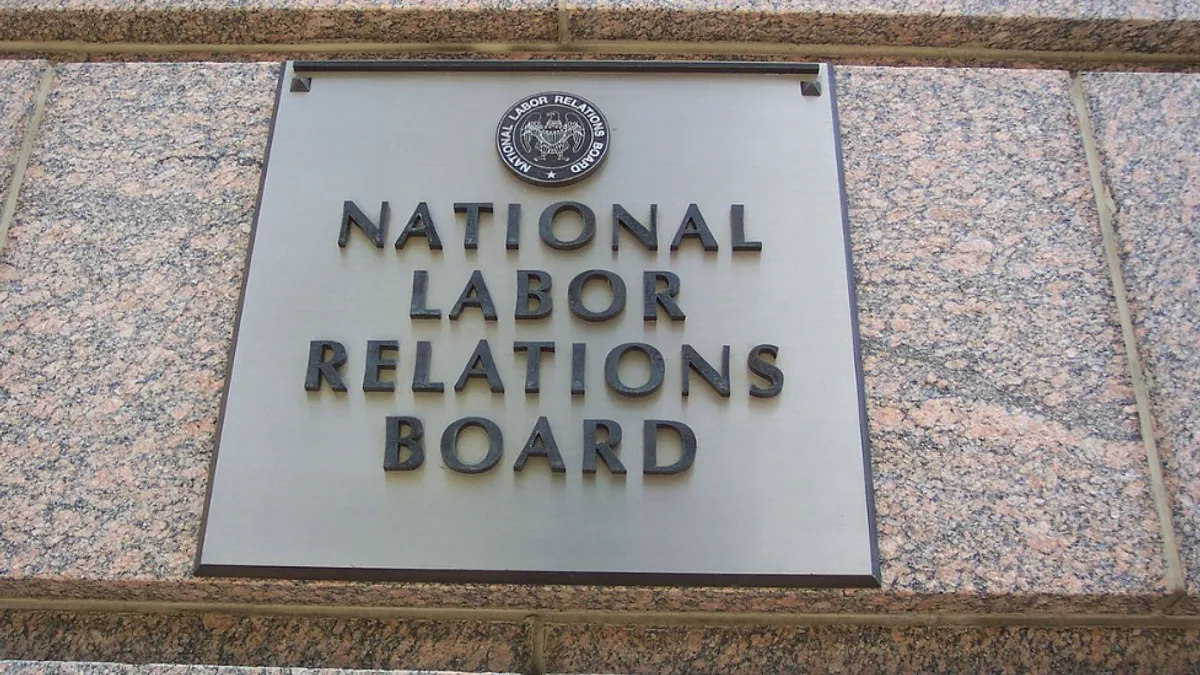Dive Brief:
- A coalition of business interests is suing to stop the National Labor Relations Board from finalizing a joint employer rule that triggered a barrage of criticism when it was proposed in October.
- The rule seeks to treat franchisors, general contractors and others that have a contractual relationship with other companies as joint employers for labor-law purposes if they exercise, or could exercise, control over the other companies’ employees, what the coalition calls an unwarranted expansion of liability that will destabilize long-standing practices without benefiting employees.
- “The rule replaces a clear standard, under which employers have tailored their business arrangements, with an arbitrary and uncertain standard that threatens chaos and indeterminacy in national labor relations across major industry sectors,” says the coalition, which includes the U.S. Chamber of Commerce and groups representing franchisors, contractors and other businesses that often work in contractual relationships with partners.
Dive Insight:
Critics’ biggest concern is over the proposed rule’s expansion of joint employers to include companies that have indirect or reserved control over just one aspect of the employer-employee relationship. Currently, based on how case law has evolved over the decades, a company must possess a certain amount of control over the “essential terms and conditions” of workers’ employment. That means wages, hours, duties and other terms like that.
Designating a company a joint employer if it only has control over one term of employment, like wages, even if the control is indirect or “reserved” but never exercised, creates a problem for any number of business models that involve two companies operating in a business-to-business contractual relationship.
A franchisor, for example, in the exercise of its brand standards, could be considered a joint employer with a franchisee when it comes to negotiating wages and work hours.
Or a general contractor could be considered a joint employer with a subcontractor to the extent it imposes safety rules on anyone who works at a construction site. That means a contractor that requires anyone at a construction site to wear a hardhat could be forced to sit down with a subcontractor to negotiate wages of the subcontractor’s employees.
“A general contractor must exert a degree of control over subcontractors and their employees to ensure that work on a given project meets efficiency, quality, and safety benchmarks,” the groups say in their complaint. But that shouldn’t obligate them to act as a joint employer on labor matters.
“In sum, the rule will disrupt long-established operational methods by which construction service providers work together … and will clearly have a harmful effect on both small and large businesses in the construction industry,” the complaint says.
Nor is the rule even needed. NLRB has said it needs to promulgate a rule after it rescinded a Trump administration rule that sought to create a regulatory standard that was much more narrowly focused, but the courts over decades have provided companies and the agency with direction on what constitutes a joint employer.
“The board’s new rule jettisons the common-law boundaries that define the NLRA and harms the workers, labor unions, and employers the board purports to protect,” the groups say.
The rule is scheduled to take effect in late December. The groups are asking the court to vacate the board’s rescission of the Trump administration’s rule and its promulgation of its proposed rule, and enjoin the board from enforcing the new rule.











